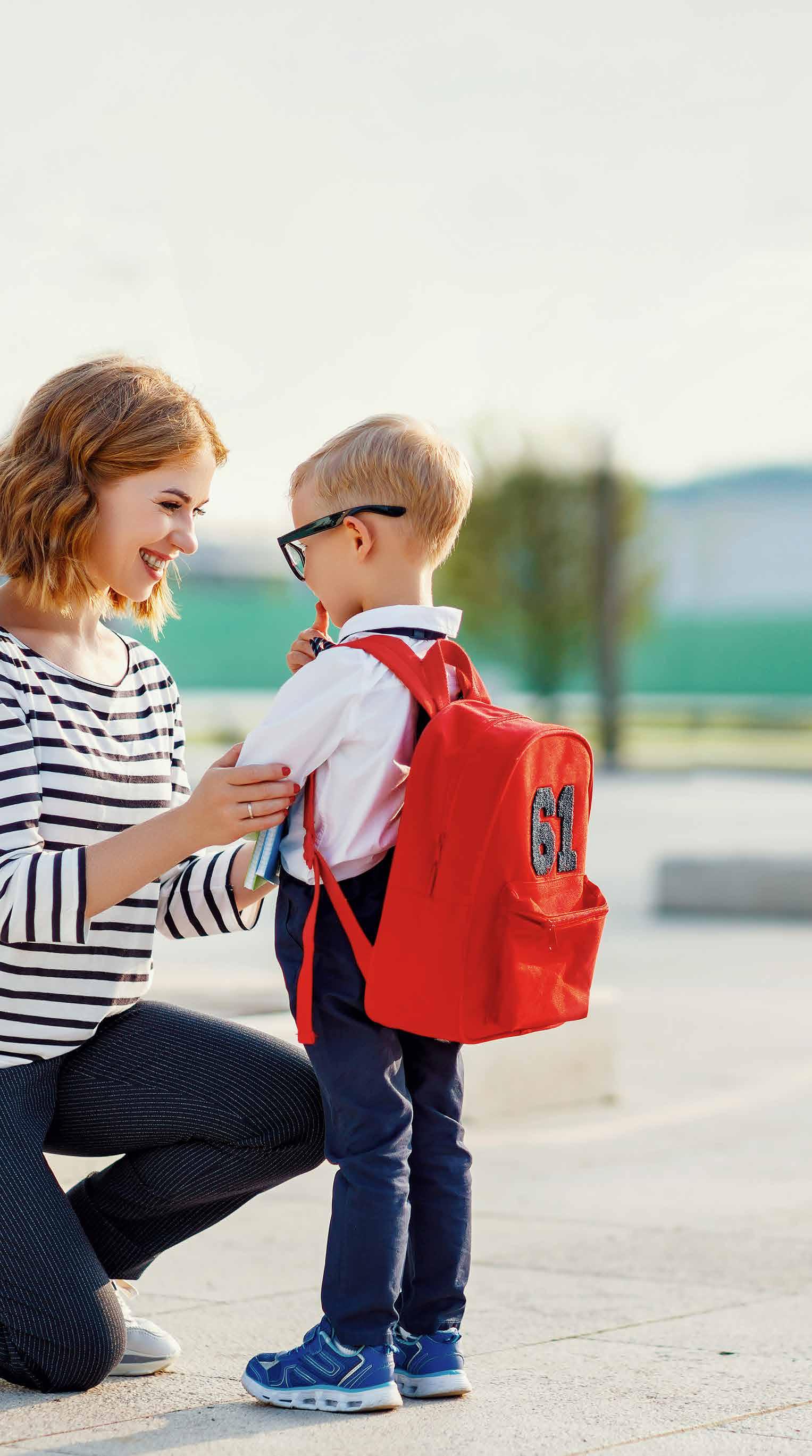
5 minute read
School Readiness & Preparing for School
By Pregnancy, Birth & Baby
WHAT DOES 'BEING READY' FOR SCHOOL MEAN? STARTING SCHOOL IS A BIG EVENT IN A CHILD'S LIFE, AND FOR THEIR FAMILY. TO GET OFF TO A GOOD START, CHILDREN NEED TO DEVELOP A RANGE OF SKILLS, SO THAT THEY WILL BE READY TO LEARN WELL AND BE HAPPY AT SCHOOL. ALL AUSTRALIAN CHILDREN MUST START SCHOOL BY THE TIME THEY TURN 6 YEARS OF AGE. MOST CHILDREN START BETWEEN THE AGES OF 4 AND 5 YEARS.
Your child will use many different skills, even in their first days and weeks at
-Physical health and development: running, jumping, climbing, and playing ball, holding a pencil and turning pages in a book.
-Practical skills: using the toilet independently and washing their hands, unpacking their lunch box and eating their lunch.
-Social skills and concentration: sharing, taking turns, getting along with others, following rules and instructions.
-Emotional maturity: talking with people they don't know, being able to play and share with others, and coping with being angry, sad or frustrated.
-Language and communication skills: listening to others speaking and expressing their thoughts clearly and understanding what the teacher says.
WHY DO THESE SKILLS MATTER?
At school, your child will be expected to:
SEPARATE FROM YOU WITHOUT BEING UPSET
WAIT PATIENTLY FOR ATTENTION IN A LARGE GROUP OF CHILDREN
TAKE TURNS, SHARE AND PLAY WELL WITH OTHER CHILDREN
EXPRESS THEIR FEELINGS AND NEEDS POLITELY
COPE WITH FRUSTRATION
FOLLOW INSTRUCTIONS
STICK WITH A TASK
If your child is not able to do these tasks, they might still be able to start school in a supported environment. This might involve a special needs school, or a mainstream school with extra support. If your child has special educational needs, a physical or learning disability, ask the school about what support is available. In some schools, the support team may include your child's teacher, education assistant, principal, school psychologist, medical doctors, or other specialist service providers.
MAKING AN INFORMED DECISION
There are things you can do to help your child enjoy school and thrive in a challenging environment:
-Watch how your child copes in different situations and teach them skills to work out how to manage by themselves.
-Ask your child's teacher at day care or preschool how they cope in difficult social or learning situations, and what skills they need to work on.
-Talk to early childhood staff at your chosen school about how they plan to meet your child's needs.
-If your child has a physical or learning disability or other special needs, check how the school plans to include them in the learning program.
HOW DO I KNOW IF MY CHILD IS READY FOR SCHOOL?
Making the decision to send your child to school is a big step. Whatever you decide, family, friends or even strangers might question your decision. If you've thought it through, and taken advice from experts, and thought about your own family situation, then that's the best you can do.
Trust yourself — you know your child best. You've thought about what is best for your child and acted on it. Once you've made your decision, work with your child to help them get ready for school, build their strengths and work on their weaknesses.
HOW CAN I GET MY CHILD READY FOR SCHOOL?
Developing your child's sense of independence is an important part of getting them ready to go to school.
You can build your child's skills, and help them get ready for school:
-Show them what going to school will be like; give your child practice preparing for a school day, and even travelling to and from the school.
-Establish routines for bed time and morning time, as well as healthy eating habits.
-Teach them to put on their own clothes, including how to do up buttons and velcro fasteners.
-Make sure they can go to the toilet independently, including hand washing.
-Involve them in packing their lunch box or bag for a family trip.
-Give them responsibility for household tasks, such as feeding a pet or setting the table.
-Take them to the new school to play on the equipment, and to show them the classroom and toilets.
HOW CAN I HELP MY CHILD PREPARE SOCIALLY FOR SCHOOL?
You can help your child develop social confidence:
-Take them to meet their new teacher and other children who will be with them at school.
-Have play dates with other children, so your child can learn social skills, such as sharing toys and attention.
-Encourage them to join a game with other children, so they practice waiting while others have their turn.
-Model how to deal with disagreements and stay friends.
-Gradually extend your child's ability to stick with and finish a task, giving specific, positive feedback. For example, you can say, 'You spent ages putting away your toys; you must feel pleased with your work'.
-Reassure your child that they can deal with challenges and that you and their new teacher are available to help, if needed.
Pregnancy, Birth & Baby is Australia's leading pregnancy and baby website supporting parents on the journey from pregnancy to preschool. Discover more about pregnancy, birth, being a parent and raising a child. pregnancybirthbaby.org.au










